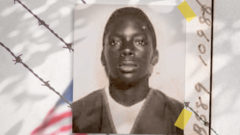Is Mark Gordon a Psychopath? Survivor Shares Her Harrowing Story of Rape at 14

Understanding the Complexities of Criminal Justice: The Case of Mark Gordon
The case of Mark Gordon, a man whose criminal past is marred by heinous acts of violence and sexual assault, has resurfaced in the public eye due to recent legal proceedings in the UK. This case not only highlights the complexities of the criminal justice system but also raises critical questions about the treatment of offenders and the long-term impact on victims. With a history of violent behavior dating back to his teenage years, Gordon's actions have left a lasting scar on those who suffered at his hands. This article delves into the details of his crimes, the implications of the judicial decisions made, and the broader context of criminal rehabilitation.
The Early Life of Mark Gordon
Mark Gordon was born in the UK and moved to the United States with his mother at a young age. Initially residing in New York, they later settled in Miami, Florida. His formative years were marked by upheaval, and it is alleged that he became a victim of abuse himself. This background may have contributed to his later actions, yet it does not excuse the violent crimes he committed. The trajectory of his life took a dark turn when, at just 14 years old, he committed a brutal rape that would lead to a lifetime of consequences.
The Horrific Crime in 1989
On a fateful night in April 1989, Gordon broke into the home of a neighbor, Jane (a pseudonym for her protection), armed with a knife and garden shears. This violent invasion lasted over four hours and was marked by repeated assaults, threats, and psychological torment. Gordon's chilling threats to Jane, including remarks about harming her children, demonstrated a calculated cruelty that is often associated with psychopathic behavior.
During this attack, Jane was forced to confront her worst fears. She described the terror of being told she was worthless and the very real fear that her life was about to end. The psychological scars from such an ordeal can last a lifetime, and Jane's life did change irrevocably after that night. Her story is a poignant reminder of the long-lasting impact of such violence on victims and their families.
The Legal Proceedings and Sentencing
Gordon was eventually apprehended and faced multiple charges, including armed sexual battery and armed kidnapping. Following a chaotic trial process, he was convicted and sentenced to 40 years in prison in 1990. Despite his young age, the nature of his crimes warranted a severe penalty, reflecting the court's recognition of the threat he posed to society.
During the sentencing, Gordon's mother attempted to elicit sympathy from the court by citing his own history of abuse as a child. While it is crucial to address the cycle of violence and trauma, courts must also prioritize public safety and the protection of potential future victims. Ultimately, Gordon's plea for leniency was unsuccessful, and he served 20 years before being deported back to the UK.
The Aftermath of the Assault
For Jane, the aftermath of the assault was devastating. The sense of safety that once permeated her home was shattered. She struggled with nightmares, anxiety, and a profound sense of loss. Jane's experience underscores a critical aspect of violent crime: the emotional and psychological toll on victims can be as damaging as the physical acts themselves.
- Nightmares and anxiety disorders
- Loss of personal safety and trust
- Impact on family dynamics and relationships
- Financial repercussions due to relocation and therapy costs
Jane's decision to sell her home in Florida, a place filled with memories, further illustrates the extent of her trauma. This emotional upheaval is often overlooked in discussions of criminal justice but is paramount in understanding the full impact of violent crimes.
The Recent Developments in the UK
Fast forward to recent years, and Gordon's name has resurfaced in connection with a tragic case involving his partner, Constance Marten, and their newborn child, Victoria. The couple went on the run from UK authorities, prompting a nationwide search. Eventually, they were arrested and charged with gross negligence manslaughter after the tragic death of their child.
This latest chapter in Gordon's life raises critical questions about his rehabilitation and the systems in place to monitor offenders after their release. His return to society and subsequent actions highlight the potential failures in the criminal justice system regarding the management of sex offenders, particularly those with a violent history.
Public Reaction and Legal Implications
The public reaction to Gordon's case has been one of outrage and disbelief. Many argue that individuals with such a violent history should be monitored more closely and that preventive measures must be taken to protect the community. The legal implications of Gordon's past crimes, especially his return to the UK as a registered sex offender, call into question the effectiveness of rehabilitation programs for violent offenders.
Victims like Jane often feel betrayed by a system that they believe does not adequately protect them or consider the long-term effects of trauma. The juxtaposition of Gordon's past and his recent actions has reignited discussions about the rights of victims versus the rights of offenders, particularly in cases involving severe violent crimes.
The Importance of Victim Advocacy
In light of Gordon's case, the importance of victim advocacy and support cannot be overstated. Organizations dedicated to assisting survivors of sexual violence play a crucial role in providing resources, therapy, and a sense of community for those affected by such crimes. The stigma surrounding sexual assault often isolates victims, making it imperative for support systems to be robust and accessible.
Victims like Jane deserve to be heard, and their experiences should inform policy changes that aim to improve the criminal justice system. The narratives of survivors can drive meaningful reform, ensuring that future generations are better protected from violent offenders.
Addressing the Cycle of Violence
Understanding and addressing the cycle of violence is essential for preventing future crimes. Those who experience trauma, particularly in childhood, are at a higher risk of engaging in violent behavior later in life. By investing in early intervention programs and mental health services, society can work towards breaking this cycle.
Furthermore, educational programs that promote healthy relationships, consent, and emotional intelligence can equip individuals with the tools they need to make positive choices. The criminal justice system must also prioritize rehabilitation and reintegration for offenders, focusing on addressing underlying issues rather than simply punishing behavior.
Conclusion
The case of Mark Gordon serves as a troubling reminder of the complexities within the criminal justice system, particularly concerning violent offenders. The impact of his actions extends far beyond the courtroom, affecting the lives of victims and their families for decades. As society grapples with how to handle such offenders, it is crucial to prioritize victim advocacy and support, ensuring that those who have suffered are not forgotten in the pursuit of justice.
As we reflect on these issues, it is essential to consider how we can foster a safer community for all, particularly those who have been victims of violence. The stories of survivors like Jane should inspire action and reform, pushing us to create a society that values both justice and healing.
Frequently Asked Questions
What are the psychological effects of violent crimes on victims?
Victims of violent crime often experience a range of psychological effects, including PTSD, anxiety, depression, and difficulties with trust and relationships. These effects can last a lifetime and significantly impact their quality of life.
How does the criminal justice system handle sex offenders?
The criminal justice system typically monitors sex offenders through registration requirements, parole, and treatment programs. However, the effectiveness of these measures can vary widely, and concerns about public safety often arise when offenders reintegrate into society.
What support is available for victims of sexual violence?
Victims of sexual violence can access various support services, including counseling, legal aid, and support groups. Organizations dedicated to victim advocacy are crucial resources for those seeking help and guidance.
Reflecting on the journey of justice, how can we ensure that the voices of survivors are heard in shaping the future of our criminal justice system? #JusticeForVictims #SurvivorStories #EndViolence
Published: 2025-07-14 14:10:10 | Category: technology



